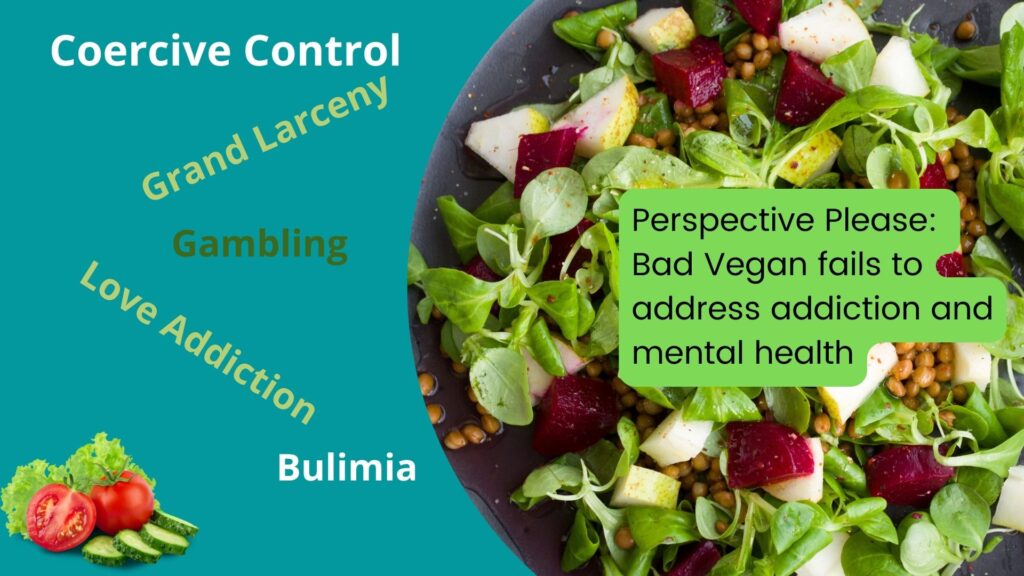Netflix nailed handling how the nuances of racism played out in the two-hour documentary The Rise and Fall of Abercrombie and Fitch yet failed to address the mental health and addiction issues in the 2022 four-hour long Bad Vegan: Fame. Fraud. Fugitives. docuseries.
Bad Vegan focuses on the rise and fall of New York City vegan chef and high-end restaurateur Sarma Melngailis who has an MBA from Ivy League University of Pennsylvania’s Wharton School, which U.S. News and World Report ranked number one in their 2020 annual ranking. She and her boyfriend, fellow A-list chef Matthew Kenney, line up deep-pocketed investors, and, in 2004, open Pure Food & Wine, a raw vegan restaurant, which quickly became a raging success and a magnet for celebrities.
Eventually, their relationship sours, and she convinces Pure Food & Wine’s main financial backer to kick out Kenney and let her run the restaurant on her own.
Why weren’t the dynamics of this relationship discussed given the trajectory of Melngailis’ ensuing reckless and destructive behavior?
A November 2016 article in Vanity Fair reports that before they broke up, Melngailis took on Kenney’s $500,000 mortgage debt from another business venture. She’s a Wharton grad… this move makes no sense whatsoever and reeks of love addiction or co-dependency, prevalent conditions that are little understood. Where were the experts to help us understand?
Why is a thriving restaurant in debt?
Despite Melngailis’ strong work ethic and MBA, she becomes awash in debt. A November 2016 article in Vanity Fair reports that Pure Food and Wine made a lot of money.
“It was profitable, too, often serving more than 200 covers on a night and, with related businesses, yielding revenues of around $7 million and profits of about $500,000 annually, a former manager said,” How Sarma Melngailis Became a Runaway Fugitive, Vanity Fair
This 2016 article mentions Melngailis’ bulimia, an eating disorder, and her prescriptions for Ambien and Wellbutrin. Ambien, a sleeping pill, has been linked to dangerous side effects. Is her affinity for raw vegan food partly due to OCD? Why was none of this discussed in Bad Vegan released in 2022, six years after the Vanity Fair article?
Gambling addiction
After her relationship wsxith Kenney ends bitterly, Melngailis ends up marrying Anthony Strangis, an erratic individual who promises to pay her debts if she first lends him money, which she does over the course of two years. Then they take off for an extended vacation all over Europe. Eventually, the employees walk out of the restaurant as they are no longer getting paid.
After Europe, they run off to Las Vegas. They hop from casino to casino, and he proceeded to gamble away over a million dollars of the restaurant’s funds. A 2022 Newsweek review of Bad Vegan reports:
“The official indictment alleged that Melngailis transferred more than $1.6 million from business accounts to her personal bank account with Strangis spending $80,000 at specialty watch retailers, more than $70,000 at hotels in Europe and New York, and more than $10,000 on Uber car rides.”
Gambling could just be the most perplexing addiction of all. Why were no experts interviewed to discuss it? Being able to gamble 24-7 from anywhere courtesy of smartphones and the advertising of sports betting makes this a timely concern.
Statistically there is a correlation between the thrill-seeking behavior that characterizes the manic or hypomanic phases of bipolar depression and gambling addiction. Often the bipolar depression is undiagnosed. (Two studies that discuss the link between bipolar and gambling: Bipolar disorder and gambling disorder comorbidity and Gambling problems in bipolar disorder in the UK.)
Parents enable
During the time Melngailis and Strangis are in Las Vegas, Melngailis’ parents dip into their retirement fund to send them $400,000. Why her parents are willing to enable such shady and irresponsible behavior is never discussed either.
Domestic violence
The Vanity Fair article also quotes experts and discusses coercive control, which is a form of domestic violence in which one spouse brainwashes the other spouse to gain control of them. This might explain Strangis’ manipulation of Melngailis.
White Hot gets it right
The two-hour Netflix documentary, White Hot: The Rise and Fall of Abercrombie and Fitch, offers insight and perspective on how racism and discrimination played out in the workplace. Subject matter experts were interviewed along with former Abercrombie and Fitch workers. (Meredith Blake’s Los Angeles Times review of White Hot, Abercrombie and Fitch was America’s Hottest Brand: It became what discrimination looks like.)
Hoarders is another show that offers some insight into mental health challenges. Individual hoarders are shown working with a therapist and an organizer. Family members are interviewed as to how the afflicted individual’s behavior affects them, and their interactions with the hoarder are shown.
I could not imagine Bad Vegan’s unusual storyline let alone write it. There was a missed opportunity to shed light on aberrant behavior instead of producing yet another superficial, sensational true crime docuseries.


Unfortunately films such as Bad Vegan do not address mental health issues in their characters lives or they address them very poorly. No wonder there is still such a stigma for mental health. Homeland was one of my favorite series, however it only sensationalized bipolar disorder instead of helping address it. Carrie could go back on lithium and in a couple days she was stable again. There have been several helpful movies in explaining bipolar disorder and mental health issues, but they are few and far between.